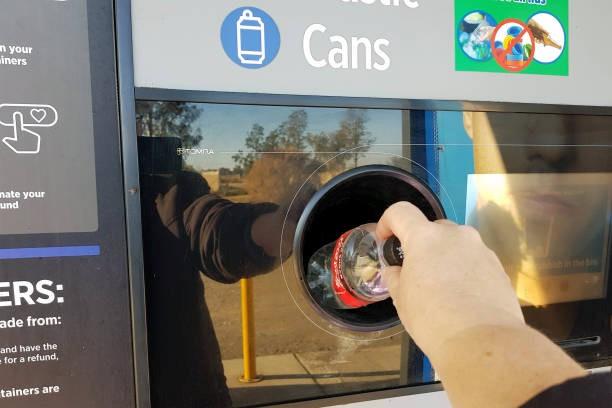The call for digital transformation is largely directed toward for-profit companies: Digitizing their operations is presented as a means of increasing their efficiency, productivity, and ultimately, revenue. But organizations focused on social impact should care as much about digital enablement as their for-profit counterparts.
Nowhere is this idea more evident than in the world of recycling. The days of lugging recyclables to a recycling center and manually turning them over to a waste management officer are long gone. Now recycling is largely accomplished via “reverse vending machines,” (RVM) where people put their cans, bottles, and other recyclables into a machine. All users need to do is choose their preferred reward, double-check the container is empty and has a readable barcode, and then deposit it bottom first into the RVM.
Although RVMs are technically impressive, they are not as optimized as they can be. While users interact with them via a digital interface, the management of this hardware is still largely field-based: Whenever an issue arises, the organization sends an engineer on-site to troubleshoot and fix the issue.
The lack of a remote management solution for recycling businesses operating reverse vending machines causes three main problems.
Subversion of the organization’s mission
Unlike recycling centers or facilities, which are few and far between, RVMs are hyper-local: They are located near where people live, so that it is as convenient as possible to use them. In fact, RVM provider Tomra has already deployed 80,000 of these units around the world, placing one of several models into the community depending on the available space. When these machines break down, people will most likely not go out of their way to find the next nearest one. Instead they may revert to behavior that is not environmentally friendly.

They may litter. They may include recyclables with the trash. They may dump their garbage where it does not belong. While these behaviors may seem nefarious, there is likely no ill-intentions behind them. People are simply creatures of convenience: We will follow the path of least resistance. If it is difficult to recycle, then we will not. Anytime a machine is out-of-order, the organization’s mission is subverted.
Negative branding
When a RVM is down, it is counter-productive. The people who lugged all their recyclables to that machine may be prone to seek a quick fix, such as by leaving the plastic bags filled with them on the sidewalk. The environment would have been better off if the inoperable hardware was never there in the first place, so the people could have instead taken the recyclables to a reliable RVM.

This irony – that the offline hardware may actually encourage bad environmental behaviors – will generate negative publicity. People will call out this organization on social media or in the press as an example of greenwashing: They want to appear like they are doing good, but they in fact really do not care. This negative sentiment can affect consumers, who will seek out other providers when it comes to their sustainability efforts.
Poor ecosystem support
People want to collaborate with companies that live up to their values, and this is all the more true for organizations that profess to strive for social impact. From this perspective, an organization that fails to advance its mission of sustainability due to run-down RVMs will repulse prospective stakeholders. These include everyone from prospective employees, volunteers, donors, partners, and more. People seek excellence, especially when it comes to how they give back.
This lack of ecosystem support is damaging. An impact-focused organization, after all, relies on far more than just customers or users to get by: These need the support of the wider community to thrive. A network of regularly unavailable RVMs will all but guarantee the community will not support your organization.
An MDM means change
Since these RVMs are already digitally enabled, these organizations just need to go one step further: Instead of relying on a field-based service model, they should switch to one built on remote management. This can be achieved through a solution in mobile device management (MDM). One such example of an MDM is AirDroid Business, which can manage any device powered by the popular Android operating system.
The immediate value of an MDM is simple. Organizations no longer have to deploy field engineers on-site, while the RVMs sit unused. Because an MDM can help them monitor this hardware in real-time, their IT teams can instead troubleshoot the problem immediately and get it back into service much quicker. This service procedure will dramatically minimize downtime on this crucial hardware.
Maintaining a higher uptime is not valuable for its own sake, but for the benefits it ultimately creates for the organization.

A greener world
The first benefit is the most obvious: When RVMs are running smoothly, people will use them more. The neighborhood will have less litter, trash cans will be free of recyclable goods, and more recyclables will be deposited into this hardware. One root cause is the sheer availability: A longer uptime means that there is a wider window in which to recycle.
There is also a mental factor at play. People will be encouraged to recycle, knowing that they will likely not haul their recyclables to the RVM only to be greeted with an out-of-order sign. Uptime, in short, fosters positive behavior.

AirDroid Business has several features that ensure this high uptime. Most RVMs will likely be unattended. These can be fixed through the MDM because it enables full remote access. In this way, an IT professional can magnify their reach: Rather than fix devices one-to-one, they now have the flexibility and bandwidth to operate on a one-to-many basis.
Organizational success
Every organization that maintains RVMs may have a different structure. Some may be social enterprises. Others may be local government units. Still others may be B corporations. No matter their structure, their success is still in some way linked to how many people recycle. This metric feeds into profits, government funds, donations, grants, and other financial sources.
In addition to the greater uptime, an MDM has other features that increase how many people will recycle in these machines. The recycling process with some RVMs is anonymous: People just make their deposit of recycles and get a printed voucher, which can be redeemed for cash or a discount.
In other cases, the recycling process is tied to a person’s identity. The person must download an app, which generates a QR code for the machine to scan, so that disbursement can be done entirely digitally. With SGRecycle, for example, withdrawal can be accomplished via PayNow, Fast Bank Transfer, or EZ-Link, while a program from the National Environment Agency offers vouchers and deals via an app. Because the RVM system has user data – including access to personal information or financial data – it is important for them to maintain the highest security standards.

AirDroid Business maintains this necessary level of security. When remote staff are fixing a RVM, they can toggle on Black Screen Mode. This grays out the machine, so that none of the back-end interface is visible to passerby, which is a major security vulnerability on other remote access software. When the staff member is done, he can push the RVM back into operation.
By maintaining the highest security standards through features like Black Screen Mode, users will feel comfortable entrusting their data with the organization and recycle more through their RVMs.
People optimization
RVMs are an extraordinary piece of technology. Some of them sort the various recyclables into their respective categories. Others even smash the recyclables so that they are more compact when transporting.
Despite this sophistication, there is still a significant human element to RVMs. Company staff must pick up the recyclables on a regular basis, and operate on even more frequent cadences for smaller machines. While this kind of logistics may seem outside of the scope of an MDM, it can help here, too.
When an organization issues a smartphone to company drivers, these can be equipped with an MDM. The location tracking on the device will give a birds-eye view of where vehicles are and how they get from point A to point B. This level of insight will facilitate route optimization, which will help not only cut-costs, but accelerate recycling rates.
By optimizing routes between RVMs, drivers can shorten their drive time and pick up recyclables when storage is at or near capacity. This will maximize how much is recycled each month, while minimizing the environmental footprint it takes to do so.
An MDM, in short, enhances not only the operation of the RVMs themselves, but also the logistics involved in running them.
👉 Free Download: AirDroid Business MDM For Logistics & Transportation Datasheet
Discover how to monitor data roaming usage and remotely troubleshoot drivers’ devices. Automate app updates without drivers’ assistance.
Redefining the meaning of reverse vending machine
Reverse vending machines are so-named because they mirror the act of buying an item from a vending machine: Only instead of getting a soda bottle out, users are putting one back in. With the incorporation of an MDM into any recycling business, their reverse vending machines will now have several meanings.
Their RVMs will help reverse the damage of pollution by providing users with an always-on avenue for recycling. Their RVMs will help reverse the trend of consumer apathy toward recycling by making them feel comfortable to do so with best-in-class security practices. An RVM paired with an MDM is effectively a kind of time machine: It helps restore things to how they should have always been in the first place.
Leave a Reply